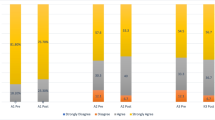Abstract
This study aimed to assess college providers’ basic knowledge of the health risks of young adult cancer survivors (YAS) and related care guidelines and to determine whether an educational in-service is an effective platform for increasing college health providers’ knowledge about survivorship care at a large university health center. During phase 1, staff from college health centers and office of disabilities in the Philadelphia area (n = 40 staff members from 24 colleges/universities) completed a needs assessment on their experiences with YAS and preferences for education and care coordination. During phase 2, a 1-h educational in-service, informed by results of the survey, was provided to 18 health center medical providers. While most providers indicated that YAS are at risk for chronic health conditions because of cancer treatment, nearly all were unfamiliar with the content of published long-term follow-up guidelines for cancer survivorship. Over half did not have knowledge of cancer survivorship services in their area. All respondents were interested in more education on cancer survivorship care. Attendees of the in-service increased their knowledge of survivorship follow-up guidelines, awareness of local survivorship resources, and comfort with caring for YAS at posttest relative to baseline. The in-service was highly acceptable to providers and feasible to implement. College providers had little baseline knowledge of cancer survivorship guidelines, but were motivated to obtain more information. Through an educational in-service, college health providers may be better equipped to provide acute and longitudinal survivorship care to a vulnerable population who are at risk for inadequate engagement in risk-based follow-up care.
Similar content being viewed by others
References
Tonorezos ES, Oeffinger KC (2011) Research challenges in adolescent and young adult cancer survivor research. Cancer 117(10 Suppl):2295–2300
Oeffinger KC, Tonorezos ES (2011) The cancer is over, now what? Understanding risk, changing outcomes. Cancer 117(10 Suppl):2250–2257
Bhatti P et al (2010) Risk of second primary thyroid cancer after radiotherapy for a childhood cancer in a large cohort study: an update from the childhood cancer survivor study. Radiat Res 174(6):741–752
Children's Oncology Group (2008) Long-term follow-up guidelines for survivors of childhood, adolescent, and young adult cancers version 3.0. Available from: www.survivorshipguidelines.org
Casillas J et al (2015) Identifying predictors of longitudinal decline in the level of medical care received by adult survivors of childhood cancer: a report from the childhood cancer survivor study. Health Serv Res 50(4):1021–1042
Barakat LP et al (2012) Factors that contribute to post-treatment follow-up care for survivors of childhood cancer. J Cancer Surviv 6(2):155–162
Nathan PC et al (2008) Medical care in long-term survivors of childhood cancer: a report from the childhood cancer survivor study. J Clin Oncol 26(27):4401–4409
McCabe MS et al (2013) Risk-based health care, the cancer survivor, the oncologist, and the primary care physician. Semin Oncol 40(6):804–812
Ramphal R et al (2011) Active therapy and models of care for adolescents and young adults with cancer. Cancer 117(10 Suppl):2316–2322
Quillen J, Bradley H, Calamaro C (2016) Identifying barriers among childhood cancer survivors transitioning to adult health care. J Pediatr Oncol Nurs 34(1):20–27
Ganju RG et al (2016) The effect of transition clinics on knowledge of diagnosis and perception of risk in young adult survivors of childhood cancer. J Pediatr Hematol Oncol 38(3):197–201
Kadan-Lottick N et al (2002) Childhood cancer survivors’ knowledge about their past diagnosis and treatment. JAMA 287:1832–1839
Arnett JJ (2000) Emerging adulthood. A theory of development from the late teens through the twenties. Am Psychol 55(5):469–480
Smith AW et al (2016) Next steps for adolescent and young adult oncology workshop: an update on progress and recommendations for the future. Cancer 122(7):988–999
Barnett M et al (2016) Psychosocial outcomes and interventions among cancer survivors diagnosed during adolescence and young adulthood (AYA): a systematic review. J Cancer Surviv 10(5):814–831
Nathan PC et al (2013) Family physician preferences and knowledge gaps regarding the care of adolescent and young adult survivors of childhood cancer. J Cancer Surviv 7(3):275–282
Berg CJ et al (2016a) Young adult cancer survivors’ experience with cancer treatment and follow-up care and perceptions of barriers to engaging in recommended care. J Cancer Educ 31(3):430–442
Forehand RL et al (2014) College health as a partner in the care of pediatric cancer survivors. J Am Coll Heal 62(7):506–510
Meacham LR et al (2014) University health centers and young adult survivors of pediatric cancer: changes in providers’ familiarity with and practice of survivor care. Journal of Adolescent and Young Adult Oncology 3(1):12–19
Harris PA et al (2009) Research electronic data capture (REDCap)—a metadata-driven methodology and workflow process for providing translational research informatics support. J Biomed Inform 42(2):377–381
Henderson TO et al (2010) Physician preferences and knowledge gaps regarding the care of childhood cancer survivors: a mailed survey of pediatric oncologists. J Clin Oncol 28(5):878–883
Salz T et al (2014) Survivorship care plans: is there buy-in from community oncology providers? Cancer 120(5):722–730
Berg C et al (2016b) Providers’ perspectives of survivorship care for young adult survivors of childhood cancer. J Cancer Educ 31(1):31–38
Acknowledgements
This research was supported by The Children’s Hospital of Philadelphia Community Cares Grant Program (Principal Investigator: Dava Szalda, MD, MSHP). The authors express their gratitude to participating college staff members.
Author information
Authors and Affiliations
Corresponding author
Ethics declarations
The investigators obtained Institutional Review Board approval before initiation of phase 1 of the study.
Rights and permissions
About this article
Cite this article
Psihogios, A.M., Pauly-Hubbard, H., Schwartz, L. et al. Understanding and Improving Knowledge of Cancer Survivorship Care Among College Providers. J Canc Educ 33, 1075–1081 (2018). https://doi.org/10.1007/s13187-017-1208-5
Published:
Issue Date:
DOI: https://doi.org/10.1007/s13187-017-1208-5



